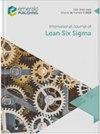A case study for surgical mask production during the COVID-19 pandemic: continuous improvement with Kaizen and 5S applications
IF 3.7
2区 工程技术
Q2 ENGINEERING, INDUSTRIAL
引用次数: 3
Abstract
Purpose With the emergence of the COVID-19 pandemic, the production shortage of personal protective equipment (PPE), such as surgical masks, has become increasingly significant. It is vital to quickly provide high-quality, hygienic PPE during pandemic periods. This comprehensive case study aims to confirm that Kaizen and 5S applications reduce wastage rates and stoppages, which as a result, created a more efficient and sustainable workplace in a small–mediumenterprise (SME) producing PPE in Turkey. Design/methodology/approach The method for this case is discussed with the help of a flowchart using the DMAIC cycle: D-define, M-measure, A-analyse, I-improve and C-control. Findings The total stoppages due to fishing line, gripper, piston and yarn welding have decreased by approximately 42.4%. As a result of eliminating wasted time and reduced changeovers, a total of 5,502 min have been saved per month. This increased production of approximately 10.55% per month, led to an addition of 506,184 units. Originality/value The use of lean manufacturing (LM), Six Sigma, Lean Six Sigma and continuous improvement methodologies are not common in textile SMEs. Based on the current literature reviewed, to the best of the authors’ knowledge, this is the first comprehensive case study that combines statistical tools, such as hypothesis tests and LM practices, in the production process for a PPE company operating as a textile SME.COVID-19大流行期间外科口罩生产案例研究:持续改进改善和5S应用
目的随着新冠肺炎疫情的出现,医用口罩等个人防护装备的生产短缺问题日益突出。在大流行期间迅速提供高质量、卫生的个人防护装备至关重要。这个全面的案例研究旨在确认改善和5S应用程序减少了流失率和停工,从而为土耳其一家生产PPE的中小型企业(SME)创造了一个更高效和可持续的工作场所。设计/方法/方法本案例的方法是通过使用DMAIC循环的流程图来讨论的:d -定义,m -测量,a -分析,i -改进和c -控制。由于钓鱼线、夹持器、活塞和纱线焊接造成的总停工减少了约42.4%。由于消除了浪费的时间和减少了转换,每月总共节省了5502分钟。每月增加约10.55%的产量,增加了506,184辆。精益制造(LM)、六西格玛、精益六西格玛和持续改进方法的使用在纺织中小企业中并不常见。根据目前的文献综述,据作者所知,这是第一个综合案例研究,结合了统计工具,如假设检验和LM实践,在生产过程中为一家纺织中小企业运营的PPE公司。
本文章由计算机程序翻译,如有差异,请以英文原文为准。
求助全文
约1分钟内获得全文
求助全文
来源期刊

International Journal of Lean Six Sigma
Engineering-Industrial and Manufacturing Engineering
CiteScore
8.90
自引率
15.00%
发文量
46
期刊介绍:
Launched in 2010, International Journal of Lean Six Sigma publishes original, empirical and review papers, case studies and theoretical frameworks or models related to Lean and Six Sigma methodologies. High quality submissions are sought from academics, researchers, practitioners and leading management consultants from around the world. Research, case studies and examples can be cited from manufacturing, service and public sectors. This includes manufacturing, health, financial services, local government, education, professional services, IT Services, transport, etc.
 求助内容:
求助内容: 应助结果提醒方式:
应助结果提醒方式:


